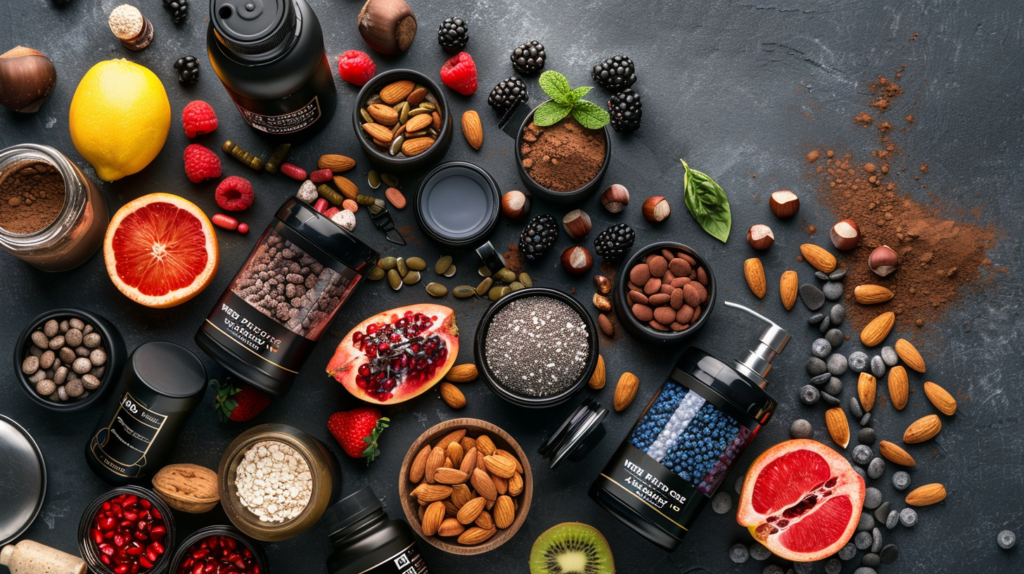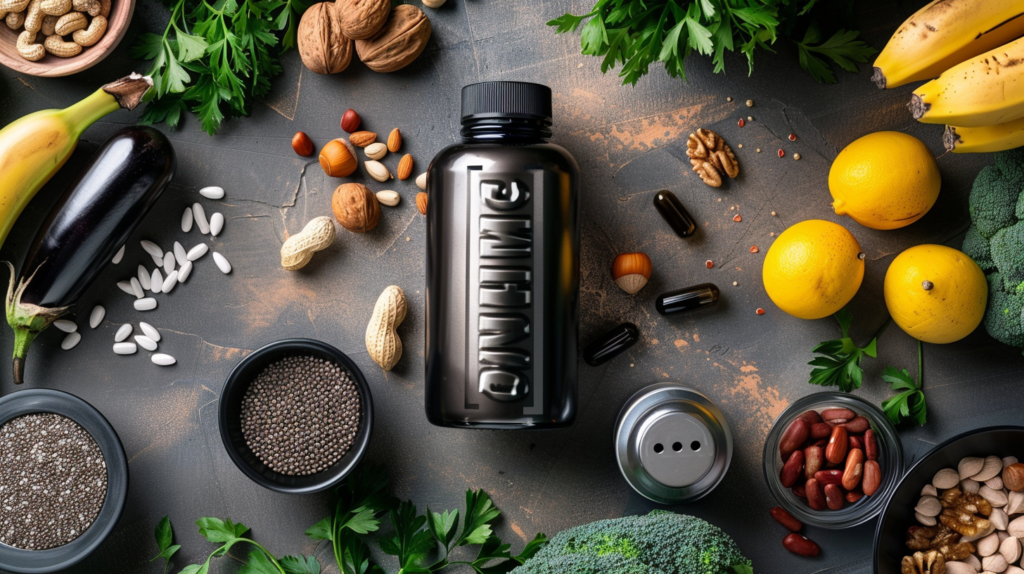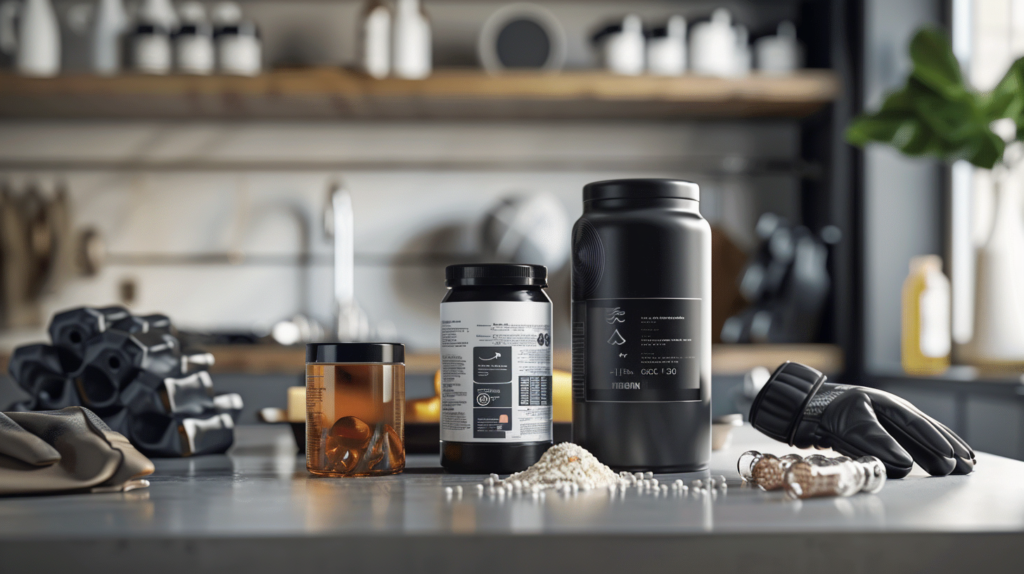Optimize your muscle growth potential with the top 10 supplements starting with the letter ‘O’ for enhanced performance and results.
We recommend incorporating whey protein for muscle growth, recovery, and essential amino acids. Creatine monohydrate boosts strength, power output, and lean muscle mass. Branched-chain amino acids aid muscle protein synthesis, recovery, and endurance. Beta-alanine buffers lactic acid buildup and enhances intense workout performance. Fish oil reduces inflammation, supports muscle protein synthesis, and nutrient delivery. Vitamin D is vital for health, immunity, and bone strength. Magnesium is essential for muscle function, growth, and energy production. ZMA aids in muscle recovery, sleep quality, and immune function. Pre-workout supplements optimize athletic performance and energy levels. Optimize your results with these top supplements.
Key Takeaways
- Whey Protein: Enhances muscle growth and recovery with essential amino acids and fast absorption.
- Creatine Monohydrate: Optimizes muscle growth, strength, and power output for improved performance.
- BCAAs: Aid in muscle protein synthesis, recovery, and endurance while preserving lean muscle mass.
- Fish Oil: Reduces inflammation, supports muscle protein synthesis, and enhances nutrient delivery to muscles.
- ZMA: Enhances muscle recovery, improves sleep quality, and boosts immune function with key nutrients.
Whey Protein

When looking to enhance muscle growth, incorporating whey protein into your diet can greatly boost protein intake and support muscle recovery. Whey protein is a complete protein containing all essential amino acids, making it an excellent choice for muscle building and repair. Consuming whey protein at strategic times, such as post-workout, can maximize its benefits due to its fast absorption rate.
One of the main benefits of whey protein is its quick digestion and absorption, making it ideal for post-workout recovery. Within 30 minutes of finishing your exercise routine, consuming a whey protein shake can kickstart the muscle repair process and promote muscle protein synthesis. This timing is essential for replenishing energy stores and initiating muscle recovery after a strenuous workout.
In addition to its timing benefits, whey protein can also be incorporated into delicious recipes and smoothies to enhance its taste and nutritional profile. Mixing whey protein powder with fruits, vegetables, yogurt, or milk can create a nutrient-dense and satisfying smoothie that can be enjoyed as a quick post-workout snack or even as a meal replacement option. These recipes not only provide the necessary protein for muscle growth but also offer a convenient and tasty way to meet your nutritional needs.
Creatine Monohydrate

To further optimize muscle growth and performance, an effective supplement worth contemplating is Creatine Monohydrate. Creatine is a naturally occurring compound that plays an essential role in the production of energy during high-intensity exercise. By supplementing with Creatine Monohydrate, individuals can experience a range of benefits such as increased muscle strength, power, and lean muscle mass.
One of the key benefits of Creatine is its ability to enhance performance during short-duration, high-intensity activities like weightlifting and sprinting. Research suggests that Creatine supplementation can lead to improvements in strength and power output, allowing individuals to push harder and achieve greater gains in muscle mass over time.
When it comes to timing, it’s commonly recommended to consume Creatine Monohydrate both before and after workouts. Pre-workout supplementation can help increase muscle Creatine stores, potentially enhancing performance during exercise. Post-workout intake can aid in replenishing depleted Creatine levels and supporting muscle recovery.
Regarding Creatine loading and cycling, some individuals opt to undergo a loading phase where they consume higher doses of Creatine for a short period to saturate the muscles quickly. Following the loading phase, a maintenance dose is typically taken daily. Cycling, on the other hand, involves periods of supplementation followed by periods of abstaining to prevent the body from becoming desensitized to Creatine’s effects.
Branched-Chain Amino Acids (BCAAs)

BCAAs, comprising essential amino acids like leucine, isoleucine, and valine, play an important role in muscle protein synthesis and energy production. These amino acids are crucial for muscle growth, repair, and overall athletic performance. One of the main benefits of BCAAs is their ability to reduce muscle protein breakdown during exercise, thereby aiding in muscle recovery and minimizing muscle soreness.
Contrary to some myths, BCAAs aren’t only beneficial for professional athletes but also for individuals engaging in regular exercise. They can help prevent muscle wasting, improve endurance, and support fat loss while preserving lean muscle mass. However, it’s important to note that BCAAs should complement a balanced diet and exercise regimen rather than replace whole food sources of protein.
In terms of timing and dosage, consuming BCAAs before, during, or after a workout can be advantageous. Pre-workout supplementation may help reduce muscle fatigue, while post-workout intake can support muscle recovery and growth. The recommended dosage typically ranges from 5 to 20 grams per day, depending on individual goals and training intensity.
Beta-Alanine

Beta-Alanine, a non-essential amino acid naturally produced in the body, plays a key role in buffering lactic acid buildup during high-intensity exercise. When taken as a supplement, Beta-Alanine can increase intramuscular levels of carnosine, a dipeptide known for its ability to reduce muscle fatigue and improve performance during intense workouts. Studies have shown that Beta-Alanine supplementation can lead to enhanced exercise capacity, especially in activities lasting between 1-4 minutes, such as sprinting or weightlifting.
To experience the benefits of Beta-Alanine, a dosage of 4-6 grams per day, taken in divided doses, has been suggested. The effectiveness of Beta-Alanine is dose-dependent, with favorable results usually seen after 2-4 weeks of consistent use. Some users may experience a harmless side effect known as paresthesia—a tingling sensation on the skin—which can be reduced by using time-release formulations or by splitting the daily dose into smaller amounts.
Fish Oil

Fish oil, a popular dietary supplement derived from fatty fish like salmon and mackerel, is rich in omega-3 fatty acids known for their numerous health benefits. Omega-3 fatty acids are essential fats that play a significant role in supporting overall health, including reducing inflammation, improving heart health, and supporting brain function. When it comes to muscle growth and nutrition, fish oil offers several benefits.
One key benefit of fish oil for muscle growth is its anti-inflammatory properties. Intense workouts can lead to muscle inflammation, which may hinder recovery and growth. Omega-3 fatty acids in fish oil can help reduce this inflammation, potentially enhancing recovery time and promoting muscle growth.
Moreover, fish oil can also improve insulin sensitivity, which is important for nutrient uptake by muscles. By enhancing insulin sensitivity, fish oil can help optimize muscle protein synthesis and nutrient delivery to muscle tissues, supporting muscle growth and repair.
When considering dosage recommendations, most experts suggest a daily intake of around 250-500mg of combined EPA and DHA, the active forms of omega-3 fatty acids found in fish oil. However, individuals engaged in intense physical activity or those with specific health conditions may benefit from higher doses under medical supervision. It’s important to consult with a healthcare provider to determine the appropriate dosage based on individual needs and health goals.
Glutamine

Glutamine, a conditionally essential amino acid, plays an important role in muscle recovery and overall athletic performance. When it comes to muscle growth, glutamine benefits are significant. This amino acid is essential for reducing muscle breakdown and promoting muscle protein synthesis, which are key processes for muscle repair and growth. Additionally, glutamine supplementation has been shown to enhance glycogen replenishment, leading to improved exercise performance and endurance.
Timing for muscle growth is critical when considering glutamine supplementation. Consuming glutamine post-workout can help replenish muscle stores depleted during exercise, supporting faster recovery and muscle growth. It can also be beneficial to take glutamine before bedtime to prevent muscle breakdown during the night when the body goes into a fasting state.
Beyond its role in muscle growth, glutamine also has implications for immune function. Intense exercise can temporarily weaken the immune system, making athletes more susceptible to infections. Glutamine supplementation has been shown to support immune function by maintaining gut health and reducing inflammation, thereby helping athletes stay healthy and perform at their best.
Vitamin D

Vitamin D, an indispensable nutrient for overall health and performance, is essential for various physiological functions in the body, including bone strength and immune system regulation. The primary source of Vitamin D is sunlight, as the skin produces it in response to UV rays. However, factors like geographical location, seasonal changes, sunscreen use, and skin pigmentation can affect the body’s ability to produce an adequate amount of Vitamin D through sun exposure. In such cases, supplementation becomes essential to meet the body’s requirements.
When it comes to muscle repair, Vitamin D plays a significant role. It aids in muscle protein synthesis and helps in maintaining muscle mass, making it an essential nutrient for athletes and fitness enthusiasts. Additionally, Vitamin D is known for its immunomodulatory effects, influencing the innate and adaptive immune responses. A deficiency in Vitamin D has been linked to increased susceptibility to infections and autoimmune diseases, highlighting its importance in supporting overall immunity.
Considering the challenges many face in getting enough Vitamin D from sunlight alone, especially in regions with limited sun exposure, supplementation can be a practical solution. It’s essential to monitor Vitamin D levels regularly, as excessive supplementation can also have adverse effects. By balancing sun exposure and supplementation, individuals can optimize their Vitamin D intake to support muscle growth, repair, and immune function effectively.
Magnesium

Having discussed the importance of Vitamin D in muscle growth and nutrition, turning our attention to the mineral magnesium reveals another essential element in supporting overall health and performance. Magnesium plays a pivotal role in various biochemical reactions in the body, including energy production, muscle function, and protein synthesis.
One of the critical aspects related to magnesium is identifying and addressing magnesium deficiency. Magnesium deficiency can lead to muscle cramps, weakness, and fatigue, impacting exercise performance and recovery. Ensuring an adequate intake of magnesium is essential for ideal muscle function and growth.
To combat magnesium deficiency, incorporating magnesium-rich foods into your diet is key. Foods such as nuts, seeds, leafy green vegetables, whole grains, and legumes are excellent sources of magnesium. Additionally, some fortified foods and supplements can also help meet your magnesium requirements.
Maintaining proper levels of magnesium is crucial for athletes and fitness enthusiasts looking to enhance their muscle growth and performance. By being mindful of magnesium intake and addressing any deficiencies, individuals can support their overall health, optimize muscle function, and improve exercise outcomes. Remember, a balanced diet rich in magnesium can be just as important as any supplement when it comes to supporting muscle growth and functionality.
ZMA (Zinc, Magnesium, Vitamin B6)

Addressing the significance of ZMA (Zinc, Magnesium, Vitamin B6) in muscle growth and nutrition, this supplement combination plays a vital role in supporting various aspects of overall health and performance. ZMA is known for its ability to aid in muscle recovery, enhance sleep quality, and boost immune function. The synergistic effects of zinc, magnesium, and vitamin B6 make ZMA a popular choice among athletes and fitness enthusiasts looking to optimize their performance and recovery.
| Benefits of ZMA | |
| Muscle Recovery | Supports muscle recovery after intense workouts. |
| Sleep Quality | Improves sleep quality, leading to better rest and recovery. |
| Immune Function | Boosts immune function, helping the body stay healthy under stress. |
When considering the ideal dosage for ZMA, research suggests that a common dosage used in studies is around 30 mg of zinc, 450 mg of magnesium, and 10.5 mg of vitamin B6. It’s crucial to mention that individual needs may vary, so consulting with a healthcare provider or a nutritionist to determine the best dosage for your specific requirements is recommended. By incorporating ZMA into your supplement regimen at the appropriate dosage, you can potentially experience the benefits it offers for muscle growth, recovery, and overall well-being.
Pre-Workout Supplements

Discussing the effectiveness of pre-workout supplements in enhancing athletic performance and energy levels is crucial for individuals looking to optimize their workouts. These supplements can provide a much-needed boost to help you power through your exercise routine and maximize your gains.
Here are some key points to take into account when incorporating pre-workout supplements into your fitness regimen:
- Energy Boosters, Caffeine Alternatives: Look for pre-workout supplements that contain ingredients like beta-alanine, citrulline malate, or even natural caffeine alternatives like green tea extract. These components can help increase endurance, focus, and energy levels during your workout without the jitters or crashes often associated with traditional caffeine sources.
- Timing, Meal Planning: Pay attention to the timing of your pre-workout supplement intake. Consuming these supplements 30-60 minutes before your workout can allow for efficient absorption and utilization of the ingredients. Additionally, contemplate pairing your pre-workout with a balanced meal or snack to ensure sustained energy throughout your training session.
Frequently Asked Questions
Can I Mix Different Supplements Together for Better Results?
Yes, mixing different supplements can enhance their effectiveness. Combining supplements strategically can provide synergistic benefits, optimizing nutrient absorption and overall impact on the body. However, it’s important to research and consult professionals for safe combinations.
Is It Safe to Take Supplements if I Have Dietary Restrictions?
While it’s generally safe to take supplements with dietary restrictions, it’s important to be cautious. Consider supplement alternatives and nutritional modifications. Always consult a healthcare provider for personalized advice. Your well-being matters most.
How Long Does It Take to See Results From These Supplements?
Seeing results from supplements can vary based on factors like consistency, diet, and exercise. Tracking progress is key, and adjusting dosage if needed can optimize outcomes. Results typically become noticeable within a few weeks to a couple of months.
Are There Any Potential Side Effects of Overusing These Supplements?
Overusing supplements can lead to potential risks like toxicity or imbalances. It’s essential to follow recommended dosages and monitor for any long-term effects. Precautions such as consulting professionals and using reputable brands can minimize these risks.
Can Women Benefit From These Muscle Growth Supplements as Well?
When it comes to female fitness, supplement benefits can vary. Gender-specific supplements can enhance effectiveness based on individual needs. It’s essential for women to consult with professionals to determine the best approach for muscle growth.
Conclusion
Overall, incorporating these top 10 supplements into your fitness routine can help support muscle growth and improve overall nutrition.
Whether you’re looking to increase protein intake with whey protein, boost endurance with beta-alanine, or enhance recovery with BCAAs, there are options for every fitness goal.
Remember, consistency and proper nutrition are key to achieving your fitness goals. So why not give these supplements a try and see the results for yourself?













